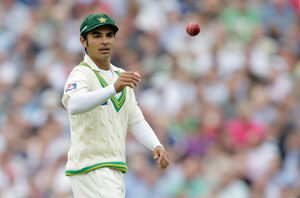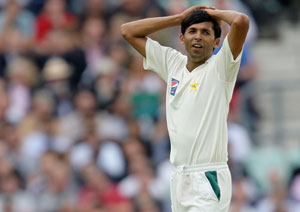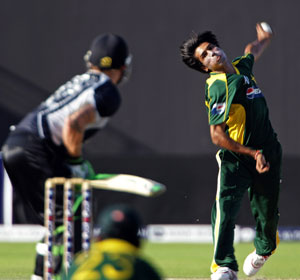In a Fix Again: How Did Pakistan Cricket Arrive in this Tight Spot?
By Afia Salam | News & Politics | Sports | Published 15 years ago
Guess it was too good to last.
Even before the celebrations over young Amir’s six-wicket haul in an innings died down, the sordid saga of ‘fancy-fixing’ (what a term!) or ‘spot-fixing’ was unfolded by the British newspaper News of the World. In a bold sting operation as part of its investigative reporting, the tabloid revealed how the ongoing Lords Test match was tainted through the shenanigans of a bookie’s agent, Mazhar Majeed, who had links with fast bowlers Mohammed Amir and Mohammed Asif, skipper Salman Butt and wicketkeeper, Kamran Akmal, who did his bidding for money.
The photographic as well as corroborating video ‘evidence’ shocked, stunned and disgusted not just Pakistanis, but generated a tidal wave of condemnation across the cricket world, resulting in calls for Pakistan’s expulsion from the ICC (International Cricket Council).
Four players were immediately in the doghouse, and more names, such as those of Wahab Riaz, Umer Akmal and Shoaib Malik, were added to the list. Scotland Yard swung into action, cell phones of the four players were seized for investigation, along with their laptops, etc. The only person to be taken into custody was Mazhar Majeed, on a charge of “trying to defraud the bookies,” a bailable offence, which is why he was out after 24 hours.
Majeed’s offence may be restricted to just defrauding the bookies, but the crime of the players is far greater. First off, it is not a case of match fixing — though the corrupt in the fraternity have done that as well. It is called fancy-fixing. In this particular instance, they bowled no-balls, on demand. True, these no-balls would not have altered the outcome of the match, but if they can come under such influences for such fancy stuff, match fixing is just the next rung of the ladder.
For the moment, the players are the accused and not the guilty (see the poll below). Be that as it may, whatever has been playing out in the media is pretty damning. News of the World had gone to Scotland Yard after doing its homework pretty well.
So what now? How did we arrive here? One answer, and I am sure past skipper Rashid Latif must be trying very hard not to say “I told you so,” is because we never blocked the road leading to this route. Rashid was one of the first whistle-blowers in the team who insisted that match-fixing was going on and named his colleagues at great risk to his career. Right from the early ’90s when the allegations, and later when proven instances of corruption at the international level started, the authorities were very slow to move — slow and inconsistent. Despite the rumble and roar of having “zero tolerance” for such shady activities in the gentlemen’s game, we saw players being pardoned, fines reduced and sentences overturned at the behest of powers that be.
And lest we Pakistanis kill ourselves through self-flagellation, this is a disease that plagues the entire cricketing world, though the subcontinent has been the hardest hit, thanks to the Mumbai underworld that has a thriving betting mafia. Internationally, we have seen captains like Azharuddin, Salim Malik and the late Hansie Cronje banned for life for match fixing, along with international cricketers like Ata-ur-Rehman of Pakistan, and Ajay Jadeja of India.
Many others were slapped with fines and other mild wraps on the knuckles. These included Shane Warne and Mark Waugh of Australia, who were found guilty of providing pitch information to bookies.

Oh Captain, My Captain: As of now, Salman Butt is not looking like the inspirational leader many thought he would be. Photo: AFP
We have seen the entire Sharjah edifice crumble and one of the main reasons was the huge influence of the bookies on the games being played there. So much so that one would see each and every player — and spectator — holding cell phones to their ears. It made one wonder if they were really there to watch/play the match.
Without dwelling too much on the past, we must see the present scandal in that very context. The repetition has been because of a lack of will on part of the authorities to deal with this menace with a firm hand. And while we are quick to blame the players and demand exemplary punishment for them, we need similar measures taken for the PCB (Pakistan Cricket Board) officials. If these things keep happening under their watch, then they are just as responsible and guilty. They may not have accepted money, but they are getting fat salaries and are not doing their jobs right. The top-heavy touring party even has a security manager whose job was to keep an eye on the players and to keep them away from shady characters like Majeed. However, reports indicate that Majeed was in and out of the dressing room — that hallowed ground where no one but the players should be. We still remember Imran Khan telling the then Board secretary, Colonel Rafi Naseem, to get out of the dressing room.
Now we hear that not only Majeed but his brother had also been socialising with the players along the boundary, in the dressing room and in restaurants, presumably because he was a players’ agent who used to get them endorsement contracts. What endorsements? These are centrally contracted players of the national team. How can they have individual sponsorships and endorsements? Then again, it appears that the players were asked to stay away from the duo. When the (mis)management saw that this wasn’t happening, what steps did it take? It is this inaction and lack of will to enforce such orders that has been the undoing of cricket in Pakistan.
But this is not all. The ICC itself has the much touted Anti-Corruption Unit (ACU), that was formed to clean up the game and keep it that way. On the ICC websites, the Terms of Reference for the ACU, and its modus operandi state:
“Allegations of corrupt activity are probed thoroughly by the Unit’s Investigators, sometimes with the assistance of Police Officers. In support of their efforts, the ACSU’s Information Manager continues to build an international network of contacts in both the legal and illegal markets so that where concerns are raised, the Unit is able to activate these relationships and effectively investigate allegations.
All players and officials that take part in the top level of international cricket pass through the ACSU’s education programme.
As part of the education process, players are given details of the ways in which corruptors may seek to ‘groom’ them from an early age as well as the penalties that exist — not just for fixing all or part of a match but also for accepting money, benefit or other reward for the provision of information or failing to disclose the inappropriate conduct of others.
The five Regional Security Managers coordinate the ACSU’s prevention measures. These experienced law enforcement professionals are present at every international series to ensure that strict anti-corruption protocols are enforced at all venues, particularly around the dressing room areas.”
Well, as can be seen from whatever went on at Lords cricket ground, the mecca of cricket, this unit too has been found wanting.
As far as the argument of poverty and illiteracy inducing the boys into temptation goes, we should not really read too much into that. How poor or uneducated were Cronje, Gibbs or Boje of South Africa; Warne and Waugh of Australia, or Azharuddin and Jadeja of India.
While education and grooming as well as financial stability do matter, we in Pakistan at least cannot really claim that a lack of these are the reasons for moral turpitude or avarice. Were it so, over 90% of our population would be made up of crooks, for they would have ample reason to be so. Instead, we see many of them toiling hard to earn an honest living, whether in the fields or factories, whereas the millions and billions that are siphoned off the tax payers money and corrupt kickbacks are done by the educated and affluent members of society.
So let us not be too quick to judge the motive. The bottom line is, the corruption in cricket exists due to the inefficiency of the people manning the echelons of power. And this inefficiency exists because there is neither any representation nor any accountability of these powerful people.

Disappointed: Perhaps instead of having his hands on his head, this cricketer should be hanging his head in shame. Photo: AFP
They are appointed at whim, by a person who should be spending his time looking after the affairs of the state instead of patronising the game, which should be run by management experts who are answerable to their shareholders or board members. And this goes for the various standing committees of legislators. They should pay attention to legislation. If they claim to be the flag-bearers (or pallbearers?) of democracy in Pakistan, then let them demand an end to ad-hocism in the PCB and restore its governing council, to which the Board management would be answerable.
No one needs to reinvent the wheel here. Look around. None of the other cricket boards are run by cricketers. They are running as smoothly oiled machines whose accounts are transparent and whose future vision is clearly spelt out.
Let us, for once, rise like a phoenix from the ashes of our own making. Let the report come out. Punish the guilty evenhandedly. Make an example out of them so it becomes a deterrent. And mind you, we need to stem the rot from its roots. Spot, as well as full-fledged fixing, is rampant through the club cricket structure, and we all know that it exists at the first-class level, as Shoaib Malik confessed to throwing a match. And he was awarded the captaincy after this confession, so that is where the trouble lies.
Just to swim upstream against the tide of anger and condemnation and demands for exemplary punishment, we need a uniform set of laws to correspond to the level of the crime. Right now, the anger within Pakistan, as well as abroad, is almost palpable, and rightly so. But do remember, life-bans, unless written into the law, violate the fundamental right to livelihood, enshrined in the constitution, as it takes away the chance of a person to express remorse, repent and correct themselves, so one should tread carefully there.

Bowled over: Allegations of spot-fixing have devastated and shamed the cricket-crazy nation of Pakistan. Photo: AFP
Also, there are always different degrees of punishments for first timers and habitual offenders. In this entire episode, the only tinge of regret that everyone has expressed has been for Mohammad Amir, who had the world at his feet. He was a raw youngster, and the PCB should have taken him in hand and explained the perils of a similar situation. Should he be punished or should the people who failed to mentor him?
As far as getting rid of the tainted players at the risk of facing a losing streak for a long time is concerned, it may be painful, but is a small price to pay for regaining some of our lost dignity and not becoming total outcasts in the world of cricket. Remember nothing binds us together as completely as cricket.
Also, what would the world of cricket do without the sparks of brilliance Pakistani players display from time to time? Surely it would also be the poorer for the loss. So, for now, let us cut our losses and move on and build the game — not just the team — on a sustainable footing. Anything else is just not cricket.
This article appears in the September issue of Newsline under the title: “In a Fix Again.”
Vote in the Poll:
Is the spot-fixing controversy involving Pakistan’s national squad a conspiracy to tarnish Pakistani cricket?
- No (52%, 150 Votes)
- Yes (46%, 131 Votes)
- Undecided (2%, 14 Votes)
Total Voters: 286
A freelance journalist, with an experience of print, electronic and web media. She writes, and trains media on climate change, gender and labour issues, as well as media ethics.


